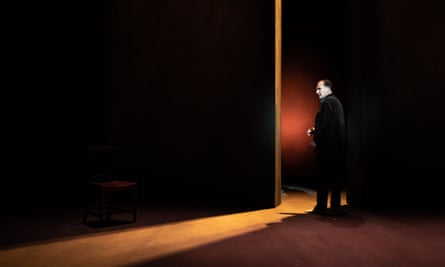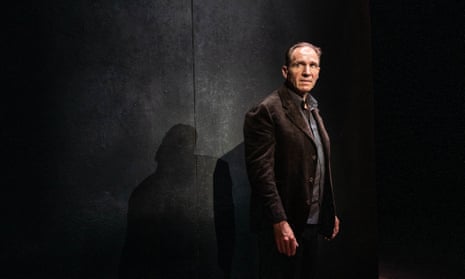By the time TS Eliot wrote his last great poem, he had turned to playwriting hoping to reach a bigger audience (the opening lines of Burnt Norton, the first in the quartet, are leftovers from Murder in the Cathedral). So Ralph Fiennes and James Dacre’s adaptation of these interconnected poems contain the spirit of Eliot’s endeavour and have star appeal to boot, with Fiennes performing them as a monologue.
But the co-production by Theatre Royal Bath and Royal & Derngate, Northampton, is a high risk venture all the same. As meditations on time, faith and meaning, the poems are filled with philosophical riddles, paradoxes, repetitions and opaque references to other texts (The Divine Comedy, the Mahabharata, Revelations of Divine Love). At times they sound like a series of mystic awakenings or even impenetrable gabble, and seem more suited to audio form for their abstractions – TS Eliot made a recording (clipped, cerebral, wooden) as well as John Gielgud (tender, transporting).
Fiennes – who has also recorded an audio version and directs this show – ekes out every last drop of drama from the poetry. Barefoot and casually dressed, he looks bewildered and childlike at the start, sitting cross-legged, his character stripped of all certainties.
There are moments that only reinforce how abstruse the poetry sounds to the ear: the paradoxes are maddening, the tone sermon-like and the interrogation of words introspective and arcane. But the fog lifts as Fiennes animates scenes with such multivoiced magnificence that they hold us rapt and the language becomes clear and powerful as he physically enacts the lines.
At his best, Fiennes is intimate and upfront, approaching the top of the stage until his toes grip its edges and infusing lines with such expression that they seem freshly polished. He brings an overt theatricality to the production and some passages sound close to Shakespearean soliloquy.

He talks about beginnings and endings, life and death, and the lines contain Eliot’s original trauma – three of the four poems were written during the second world war while he was working as a fire warden, watching London get bombed from rooftops – but they bear fresher echoes of the pandemic, too, and the scramble to find meaning in its aftermath. “We had the experience but missed the meaning,” he says, and “time is no healer”.
At his most ingenious, he finds comedy in Eliot’s irony and manages to make us titter. “You say I am repeating something I have said before. I shall say it again,” he says, chin jutting and almost with a wink.
There is a sensational moment in East Coker, written in the midst of the blitz when theatres were forced to close: the stage lights are suddenly switched off, and we sit in darkness, listening to Fiennes’ words. Moments of such illuminations feel like fireworks, worth the wait though we want more of them.
Eliot said it was not necessary to understand poetry to enjoy it but it is sometimes frustrating to be locked out of the text, which spirals into itself despite Fiennes’ deeply mined efforts.
What we lose in meaning we often gain in atmosphere and effect. At the beginning of each poem, Fiennes manipulates Hildegard Bechtler’s set, consisting of two revolving walls. Fiennes turns them to different angles and they simultaneously look clean and minimalist – a nod to Eliot’s modernism – and resemble the ancient, gnomic slabs of Stonehenge when Fiennes talks about “old stones that cannot be deciphered”.
Tim Lutkin’s lighting and Christopher Shutt’s sound design create subtle, well-crafted effects, too, from the sound of crashing waves at the start of The Dry Salvages (inspired by rocks off the coast of Massachusetts) to the sound of the blitz in East Coker.
Eliot hoped to bring serious concerns to the stage in his plays. This bold production does just that and it has an audacity that should be welcomed as a marker of post-pandemic theatre. Unapologetically complex, it makes no concessions to the viewer but asks us to think, engage, concentrate, and it is well worth the head-scratching.
At Theatre Royal Bath until 5 June. Then touring.

Comments (…)
Sign in or create your Guardian account to join the discussion